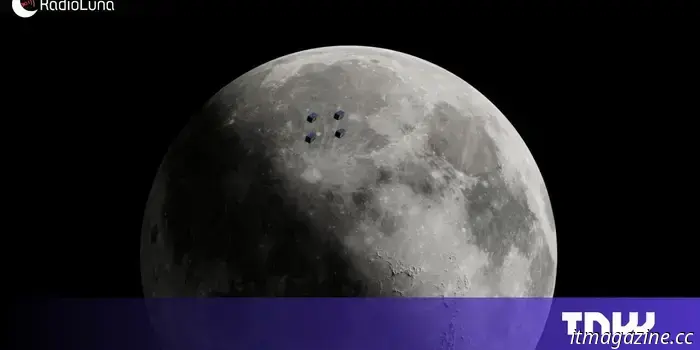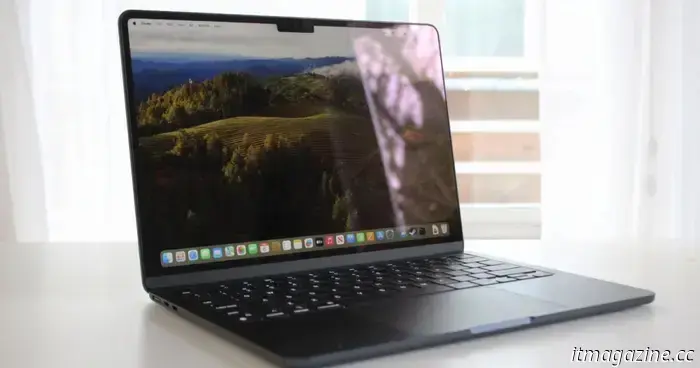
A cosmic radio station might investigate the early universe from the Moon's far side.
A UK startup is planning to establish a cosmic radio station in the Moon's orbit to detect radio waves from the early universe.
Blue Skies Space has obtained a contract from the Italian Space Agency to create a fleet of small satellites designed to orbit the Moon and search for signals from the cosmic "dark ages." This period predates the formation of the first stars, when the universe consisted primarily of a swirling mass of hydrogen gas.
Hydrogen atoms naturally produce radio waves at a specific frequency of 1420MHz, known as the hydrogen line. Over the course of 13 billion years of cosmic expansion, this signal shifts down to the FM radio band (around 88-108MHz).
Detecting these ancient radio signals from Earth is nearly impossible due to all the radio interference. However, positioning some satellites on the far side of the Moon, away from this interference, could enable scientists to filter out the noise and gather insights from the early universe.
This initiative is what Blue Skies Space, the Italian Space Agency, and space contractor OHB Italia will explore under the collaborative project called RadioLuna.
Blue Skies Space will examine if small, cost-effective CubeSats—constructed from commercial, off-the-shelf components—can survive and conduct meaningful scientific research while orbiting the Moon. Meanwhile, OHB Italia will handle the spacecraft's construction.
Mapping these signals could provide the missing link between the Big Bang and the first stars, illustrating how the universe transitioned from a smooth hydrogen fog to the cosmic web of galaxies we're familiar with today.
Dr. Marcell Tessenyi, CEO and co-founder of Blue Skies Space, informed TNW that if the project proves viable, it could lead to a commercial service.
“Depending on the technical feasibility, the funding environment, and the necessary infrastructure, we expect to be able to implement such a system within five years post-study,” he stated.
RadioLuna is not the sole project Blue Skies Space is pursuing. In October, the startup is scheduled to launch its inaugural satellite into orbit. The probe—named Mauve—is a stargazing satellite aimed at collecting data on stars in the visible and ultraviolet spectrums. This data will then be accessible to scientists and academics for a nominal membership fee.
The spacetech strategy for Europe will be discussed at the TNW Conference, which is set to occur on June 19-20 in Amsterdam. Tickets for the event are currently available. Use the code TNWXMEDIA2025 at checkout to receive a 30% discount.
Other articles
 3 sci-fi films to watch on Amazon Prime Video in April 2025
These three sci-fi films available on Amazon Prime Video that you should watch in April 2025 will transport you to another time, and one includes the late Val Kilmer.
3 sci-fi films to watch on Amazon Prime Video in April 2025
These three sci-fi films available on Amazon Prime Video that you should watch in April 2025 will transport you to another time, and one includes the late Val Kilmer.
 Adolescence has now become Netflix's fourth most popular English-language series.
Adolescence, the revealing British crime drama, has climbed to become Netflix's fourth most popular series in the English language.
Adolescence has now become Netflix's fourth most popular English-language series.
Adolescence, the revealing British crime drama, has climbed to become Netflix's fourth most popular series in the English language.
 Apple TV+ has just received a substantial price reduction that is hard to ignore, and it won’t be available for long.
Apple has quietly revealed that it will be reducing the price of its service for a limited time. Typically priced at $9.99 per month, the cost has now been lowered to just $2.99 per month. The catch? This offer won't last long. If you want to […]
Apple TV+ has just received a substantial price reduction that is hard to ignore, and it won’t be available for long.
Apple has quietly revealed that it will be reducing the price of its service for a limited time. Typically priced at $9.99 per month, the cost has now been lowered to just $2.99 per month. The catch? This offer won't last long. If you want to […]
 European startup founders put in more hours than one might expect.
Despite recent assertions that European startups lack effort, new research indicates that the founders on the continent are working diligently.
European startup founders put in more hours than one might expect.
Despite recent assertions that European startups lack effort, new research indicates that the founders on the continent are working diligently.
 The M3 MacBook Air is currently available at its lowest price ever on Amazon.
The 15-inch Apple MacBook Air M3, equipped with 24GB of RAM and a 512GB SSD, is currently being offered by Amazon at its lowest price of $1,349.
The M3 MacBook Air is currently available at its lowest price ever on Amazon.
The 15-inch Apple MacBook Air M3, equipped with 24GB of RAM and a 512GB SSD, is currently being offered by Amazon at its lowest price of $1,349.
 Netflix unveils teaser trailer and release date for season 4 of Love, Death + Robots.
Netflix has released the teaser trailer and announced the premiere date for season 4 of Love, Death + Robots, the acclaimed animated anthology series.
Netflix unveils teaser trailer and release date for season 4 of Love, Death + Robots.
Netflix has released the teaser trailer and announced the premiere date for season 4 of Love, Death + Robots, the acclaimed animated anthology series.
A cosmic radio station might investigate the early universe from the Moon's far side.
UK startup Blue Skies Space aims to establish a cosmic radio station in the Moon's orbit to capture radio waves from the early universe.
